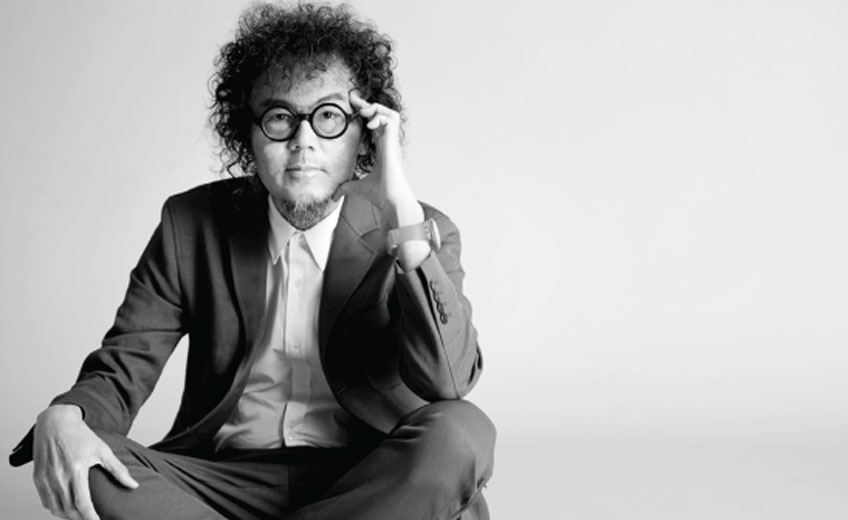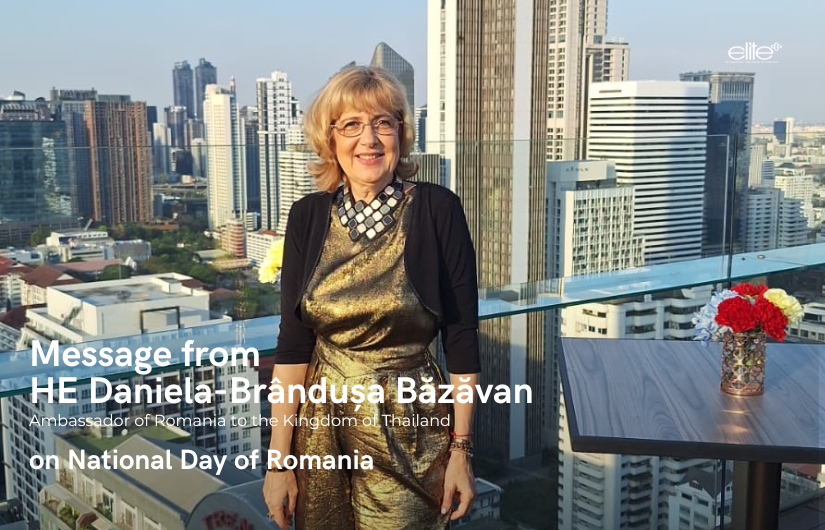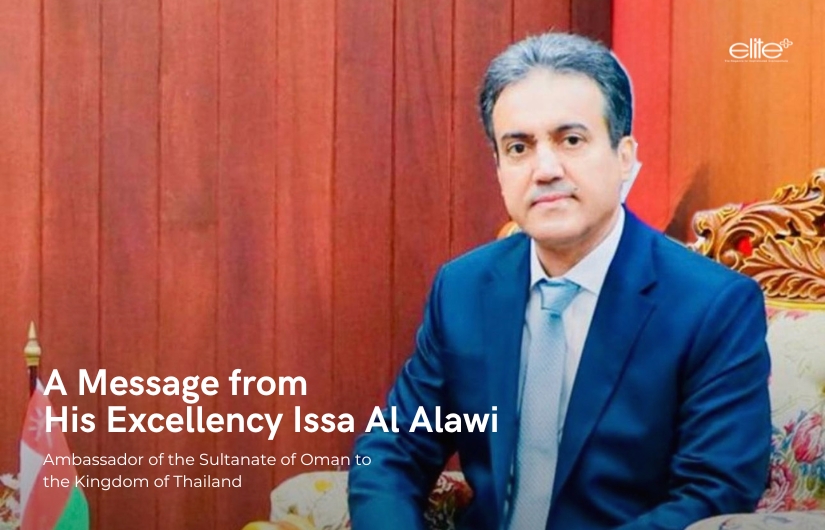Petch Osathanugrah knows about the creativity of business and the business of creativity. His career as a pop star was a departure from his family’s multi-billion-baht business, the 125-year-old Osotspa conglomerate behind the popular M-150 and Shark energy drinks, Babi Mild, 12 Plus and many more. But as the company’s executive committee chairperson and CEO, Petch says ingenuity comes just as much into play as it does in composing lyrics and songs. “I would say I’m not a real businessman,” he says. “I’m more an artist or creative person, or a businessman with creativity.”
Besides playing an integral role in the family legacy, Petch is the president of Bangkok University and a devotee of art. Elite+ sat down with the singer-songwriter and magnate to chat about his impressive body of work, artistic spirit and how he still views himself as “Just a Man, Not a Magician”, like his famous chart-topper.
- You became known as an artist and singer-songwriter. Why are you a full-time businessperson and educator?
I was born into a business family, but there have been several in my family with artistic talents. My father, Khun Surat, was a great street photographer. My aunt, Khun Spun Thienprasiddhi, was a popular designer in her own time. My aunt, Kamala Sukosol, sings, plays piano, and her two sons – Sukie and Noi – are also very good artists. My brother’s son and my first cousin’s daughter are singers. About 30 years ago, I was the first in the family to sing and play music.
I’ve played guitar since I was 12 and piano since 14. I wrote my first song when I was 12. It was called Pie Maker, which was horrible. But at 16 I started to write good songs. I could play music before I started business. Deep down I would say I’m not a real businessman. I’m more an artist or creative person or a businessman with creativity. Creativity is important in the business world too.
- Why did you choose to be involved in education?
At first, I was uncomfortable because I’m not a real professor. I’m not an academic. I’m creative. I don’t even have a master’s degree – only a bachelor’s in marketing and it took me long to finish it as I wanted to study many electives outside the marketing major. I took creative writing, painting, drawing, etc. But at university I have no problem talking and communicating with the top management. We understand each other because we’re practical and they’re also creative.
I have been helping the university for more than 15 years. I didn’t just jump into the business, but I helped form strategies and the direction of the university to become a leader. The world is so competitive right now, so marketing is important. We thought about what students could get from education and what we could offer.
- How is creativity important in the academic and business worlds?
I try to use creativity in whatever I do. Of course, there are differences, challenges or limitations. In the academic world, there are many people from the Ministry of Education who want to control everything. And the university is not allowed or encouraged to have new curriculums in something that has never been done before. It’s very difficult to come up with something totally new. It’s very sad for the country because the world is moving fast and we cannot rely on old academic theories and curriculums.
- What curriculum did you try to change?
Bangkok University has the first school of entrepreneurship in Thailand. When we wanted to come up with a new degree like master of entrepreneurship, they questioned it: “How could you do this? No one has done it before.” Somebody has to be the first one to do something that the world wants. Of course you cannot find professors with a degree in entrepreneurship. They don’t exist. It’s new for this country and quite new in the world. Only five years old. In Thailand, they mostly want somebody who has a master’s, a PhD. But the real masters, the real experts, are not professors; they’re owners of business. It contradicts the philosophy of the board of education, contradicts the trend of the world and reality.
- What did you succeed in changing?
At first, I came up with the positioning of a creative university. It’s probably one of the first in the world to have this positioning, and everything moves according to this direction. We are the first university to have an entrepreneurship programme, so now it’s creativity plus entrepreneurship. We are also famous for our school of communication arts, the biggest in Thailand, and we are strong in hotel management and tourism. We also have a school of finance, school of architecture and school of law. We are strong in intellectual property, which Thailand needs. So the achievement was positioning and a real direction.
There are creative people who have open minds. And the younger generation of students are creative and don’t want to only follow others. Even though some of them want to work for their family business, they want to create something new, like a new added value to businesses founded by their parents. And some young people want to start their own businesses. So around 30% of our students will be self-employed. We want our students to have entrepreneurial spirit.
- Is this also something you have done for Osotspa? How do you add creativity or modernize a 125-year-old family business?
It was started by my great grandfather and I grew up with the company. When I finished my degree in marketing from the States, I came back to work at Osotspa for four or five years before I started the advertising agency. Osotspa has been a pioneer in marketing and sales methods. It provided outdoor cinemas, which was part sales and marketing activities. When I was a teenager, I would go with the sales van to other provinces and run this activity. I also visited drug stores, retailers and wholesalers in Old Siam since I was young.
- But you don’t feel like a businessman?
It was not natural to become a businessman. Even though I majored in marketing, I forced myself to study. I was not interested in it until I worked as a trainee at Osotspa. I went to so many interesting meetings and developed my senses and was interested in strategies and planning. I have good common sense, logic and psychology that helps me understand human nature.
- What inspired you to lead Osotspa?
I volunteered. I thought the company needed a new leader and vision. I’m a good catalyst for change. I am open-minded and a good listener for ideas. Even in songwriting, if you say “I don’t understand this!”, if I agree, I correct it and make adjustments.
- What changes did you make at Osotspa?
We are restructuring. We have several products, so now we are reviewing product portfolios and strategies and direction. We are looking at the positioning of each brand that has been successful but might have lost a bit of direction. Some new products have potential that needs to be focused. We have to revamp. You shape a little bit, you tighten the screw and make the boat or ship go. I’m lucky; I have a great team which is very professional. And old companies do very well, but we can do better to improve. We’re making necessary changes to grow and become the best consumer product company in Thailand. I need a good team in business. As an artist, I’m more of a solo artist, but in business, I need a good team.
- Since you are busy with your businesses, will you return to being an artist or make a new album?
I think [being an artist] was in my past life. Deep down I still am an artist. But I don’t want to be any more. So I try to let go of my ego. During the creative process, there’s no ego, but afterwards, yes. When you write a song, during the process of writing, there’s no ego at all. But when it’s done, music videos are about image and ego. I try to clear my self-image. I don’t want to be famous. When you think you’re a great artist, you want people to recognize you and always think you’re a great artist. It’s a burden. I want to just disappear; I want to look at the world without having the self. You enjoy life more.
- How did you get into philosophy and Buddhism?
I suffered as a child. I didn’t have a happy family life. My dad never stayed home and my mom wasn’t happy. But suffering is the best teacher. When I went to high school in the States, I went to the library and found a book called What the Buddha Taught. I did not realize that I suffered. And then I read the book and found the answer. What the Buddha taught was basic: suffering and the end of suffering, to let go of things.
Buddhism is in my daily life but not in every moment. Sometimes you forget; thought will drag you far away. You have desires. You lose track. You have distractions. And then you come back again. But I’m working on it.
I try not to think too much. Thinking means worrying about something – about the future, about what to do. I don’t mind planning, but you can plan without worrying. Worrying is unnecessary and creates suffering. Worrying about the future, about the past, about what people have done to you and you can never let go.
- People think you are in a position where you don’t need to worry about anything.
That’s a misperception. The biggest stars and billionaires have their own worries. People think when I become like that, then I will have no more problems. That’s not true. Everyone has problems. And if you’re wealthy and you still want more, then deep down, psychologically and spiritually, you’re poor. It’s like you are always hungry and never stop eating. If you don’t have enough, you are poor inside. I think the middle way is the best. When you’re on the middle way, you don’t mind being wealthy and you don’t mind not being wealthy either.
- What’s your passion in life?
Art collecting. But I don’t want to have any passion. It’s another misunderstanding to say you need passion in life to get somewhere. Passion is like a burning fire – you don’t need to burn your heart to do something.
But I’m seeking the right balance. I do have passion in collecting art. But I want to look at it without wanting to have it. I want to be free from suffering.




















































































































































































































































































































































































































































































































































































































































































































































































































































































































